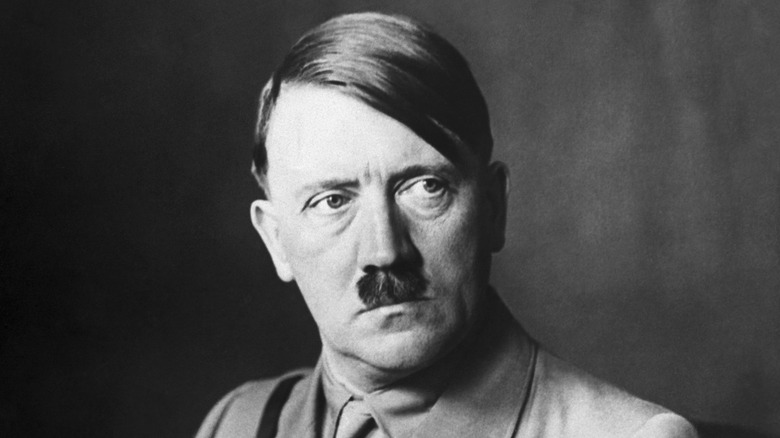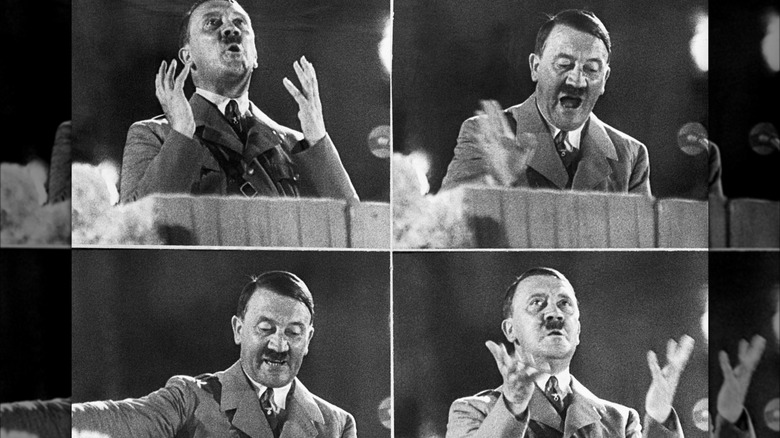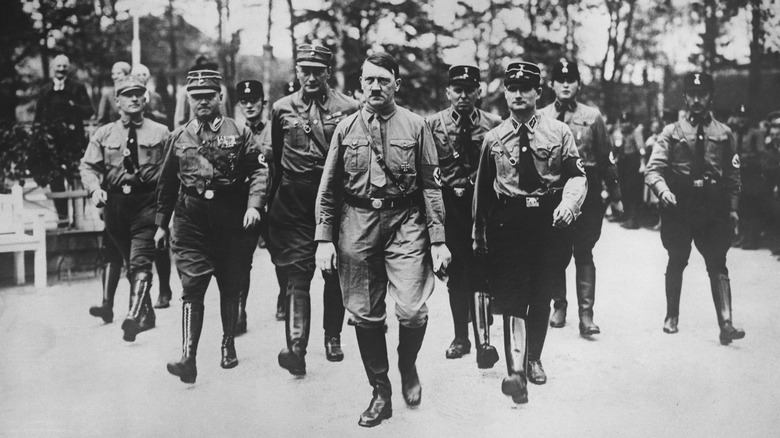A Look At Hitler's Drug Use During World War II
Adolf Hitler was addicted to opiates — to many, this may seem like an accusation out of the blue, but author Norman Ohler makes a compelling case for this exact fact in his book "Blitzed: Drugs in Nazi Germany." Within the book, Ohler outlines how the Nazi forces and Hitler himself turned to drugs in order to keep up their energy and the Nazi war effort. Ironically, during the rise of the Nazi regime, users of Illicit drugs were viewed as "undesirable social elements," per The New Republic, and those who partook were persecuted along with the other targets of Hitler's ire. But Hiter's drugs came from his personal doctor.
Hitler was known for being particular about his diet with a goal toward optimal health and he reportedly avoided even mild substances — it's said he didn't even drink coffee. In 1937, The New York Times published an article that gave an inside view into Hitler's eating habits. "It is well known that Hitler is a vegetarian and does not drink or smoke," the article read. "His lunch and dinner consist, therefore, for the most part of soup, eggs, vegetables and mineral water, although he occasionally relishes a slice of ham and relieves the tediousness of his diet with such delicacies as caviar ...."
Despite his supposed healthy lifestyle, per an interview with "Fresh Air" host Terry Gross, Ohler says that Hitler's drug use took a sharp upturn in the later half of World War II between 1941 and 1944. "Hitler needed those highs to substitute [for] his natural charisma, which ... he had lost in the course of the war, Ohler said.
Drugs were easily obtainable for the Nazi soldiers and Adolf Hitler
It wasn't just Hitler who was taking drugs during WWII. Per The Guardian, the popular drug Pervitin was available without a prescription when it first came on the market. It was often used to give someone more confidence and boost performance, even if that was just to get through the workday. Soldiers on the front line were often sleep-deprived and terrified, which is where the confidence and performance-boosting aspects of Pervitin really became appealing. However, as Ohler points out in the "Fresh Air" interview, this was no harmless magic drug. Pervitin was actually methamphetamine, or colloquially, crystal meth.
Though Pervitin was widely used what was more commonly prescribed to Hitler by his doctor, Theo Morell, was opiates. Hitler quietly became addicted over the nine years Morell — who specialized in Venereal Disease and Dermatology — was Hitler's personal physician. Morell was known for supplying vitamin injections, which is how he came to the health-conscious leader's attention. At first, vitamins were what he gave Hitler, but The New Republic reported that over time Morell regularly injected the Führer with a cocktail of drugs and supplements, ranging from various types of opiates and Pervitin to vitamins, laxatives, and "seminal extract from bulls."
Things came to a head in April 1945 when Hitler fired Morell, stating, "You have been giving me opiates the whole time! Get out of the bunker and leave me alone." Quite a few people witnessed this outburst, but it's unknown whether Hitler was trying to save face or whether he truly didn't know that Morell had been supplying him with opiates for years.
The Nazi leader could have been suffering from unwanted withdrawal symptoms
Moreover, as Norman Ohler argued on the "Fresh Air" podcast and in his book, Adolf Hitler's declining health in his final months could be attributed to him suffering withdrawal symptoms from opiates. While Hitler seemed angry Dr. Theo Morell had been giving him opiates over the years, by 1945, the drug was no longer readily available due to bombing damage to the buildings where the substance was produced. In footage taken in these months, Ohler pointed out that Hitler's hands are shaky, and he appears to have a tremor, a possible sign of drug withdrawal.
Opiates weren't the only drug Hitler was taking, though. According to Jerrold M. Post, M.D., who spoke at a Yale School of Medicine reunion, the Nazi leader was partial to amphetamines, hormones, and cocaine (via Yale Medicine Magazine). He also took sedatives, perhaps to take him down from the massive highs he would experience from these drugs. Post states that Hitler took the cocaine specifically in aerosol form for his chronic sinusitis, but he did not say what the others were for. Either way, both Ohler and Post seem certain that Hitler engaged in heavy drug use during World War II, either knowingly or unknowingly — or at least not being aware that the medicines he was being given were such addictive drugs.


